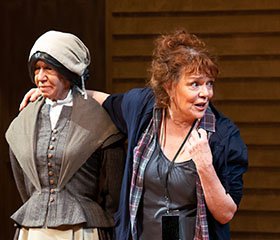It’s been quite a year for Deirdre (“Didi”) O’Connell. In June, she won a Tony Award for Best Actress in a Play for Dana H., in which she lip-synced recorded testimony with magical precision. For the past month, and continuing until the end of December, she’s been sprinkling magic of another kind on the Mitzi E. Newhouse stage, as Becky Nurse, of contemporary Salem, Massachusetts, in Sarah Ruhl’s Becky Nurse of Salem.
O’Connell made her Lincoln Center Theater debut thirty-six years ago, as Mollie Malloy in The Front Page. The other day, between a matinee and evening performance of the Ruhl play, she confessed to me that “I expected that when I reached this stage of my acting career there would be no more juicy parts. I might be the grandma with one or two scenes or the funny neighbor.” Instead, she’s currently a grandma in virtually all the LCT play’s scenes, and, while not the neighbor, certainly funny.
Why has her career upended expectations? “I think it has a lot to do,” she replied, “with the increasing number of women who write plays that now get produced. That has allowed women characters to be seen from a different perspective. Including the little things that a male writer might miss.”
How so? “It used to be that when playwrights wrote older female characters they would be embarrassed to place them in certain situations. They weren’t allowed to be sensual and God forbid that they be naked or partially undressed. That has changed. There’s a lot less embarrassment in our depictions now.”
In Ruhl’s play, this sentiment is illustrated beautifully in a scene in which Becky and her married lifelong friend Bob finally connect intimately. “That scene is a big release,” O’Connell commented. “Becky has been so beaten up by life. She carries so much sorrow. And now she has clawed her way to that good spot.” The actor added, “She and Bob – played by my wonderful stage sparring partner Bernie (Bernard White) – have to blast through a lot of walls to get there. To do so she’s taking opioid drugs and using witchcraft.”
Chems and spells may propel Becky’s breakthrough. But there’s a cost. According to O’Connell: “Act Two is a dark night of soul. There’s a downside to the drugs and to dating a married man. There are a lot of consequences.”
O’Connell talked about drugs in a real-life context. “I grew up in western Massachusetts, and I saw first-hand what happened when they moved through those towns after the jobs disappeared. My Massachusetts upbringing also gave me an intuitive understanding of the characters in Sarah’s play. Sarah isn’t from Massachusetts but she has captured the vibe accurately. With Becky, she has created a type of woman I know very well.” O’Connell grew up in a home with middle-class parents – her father was the founding president of Berkshire Community College and her mother was a writer and actress – but she is able to channel, with great empathy, a working-class woman like Becky without condescension.
O’Connell said that Ruhl has also written a play that’s “a lot of fun to do. It’s laid out like a ritual. You follow the ritual and you’ll be okay.” O’Connell mentioned one of the traps of doing a role as big as Becky. “You can’t get ahead of yourself – if you’re having a tough day personally you can’t think: ‘Only an hour to go and I’ll be done for the night.’ You have to do it step by step. Put one foot in front of the other. Though my feet aren’t quite what they were when I was younger. And let’s not even talk about my knees!”
Brendan Lemon is the editor of lemonwade.com
